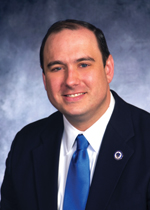By Monty Neill
To our surprise and pleasure, an MCAS reform bill (House Bill 1955) supported by Citizens for Public Schools and many other organizations received a respectful, interested and extensive hearing on May 10 at the State House. CPS lined up a dozen powerful speakers who addressed many of the flaws in the MCAS system and explained the rationale for our proposals. Sponsors Rep. Carl Sciortino and Sen. James Eldridge also came to explain why they had introduced the legislation. The presentations by the cosponsors and all the bill’s supporters were extremely impressive. (Click here to read the testimony.)
Over many past years, this legislation (first introduced in 2001 as a CARE/MTA bill, now in somewhat modified form) has received an unenthusiastic (to put it mildly) response, rarely extracting even a question despite many witnesses who spoke in favor. This year, the members of the Joint Education Committee, even those who may well oppose the bill, asked many thoughtful questions, some probing our points, some seeking further explanation.
Much of the attention was focused on students with disabilities and the limits of appeals to the MCAS graduation test, which are also addressed by a variety of other bills before the legislature.
I am not predicting victory. Those who do not want MCAS changed, for example, did not show up to testify – but if our legislation gets traction, they will be pushing hard.
But for the first time since we began introducing our bills, it is clear a significant number, perhaps a majority, of committee members seriously question the MCAS, have concerns about many of its consequences, and are open to thinking about changes needed to the system.
The question before us, then, is how to ensure that indeed the committee takes this bill seriously. For that, widespread public support is needed. Those of us closely involved in this effort will be proposing ideas on how best to build and make visible that support. We know literally thousands of people are with us, of whom only a few hundred are on the CARE/CPS listserv. So spreading the word, reaching especially members of the committee, will be imperative. But it is also a fresh opportunity to use an opening for public education and organizing, addressing not only MCAS but the direction of public education in Massachusetts. (For a summary of House Bill 1955, click here.)
[To return to the Backpack, close browser.]



